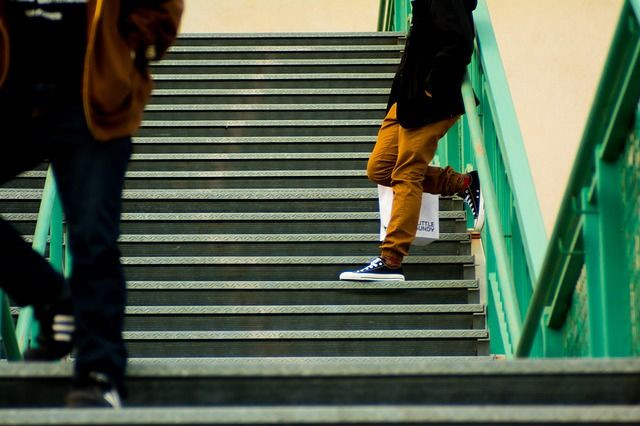Continuing Education And Walking Up Flights Of Stairs Reduces Brain Age Due To Gray Matter Growth

It’s better to take the stairs, and not just for your body. Exercise helps keep our bodies flexible and strong as we get older. Similarly, when we approach middle age, our brains may not be able to process new information the same as before. But, a recent study suggests there are actions we can work into our daily routine that may help slow down brain aging.
Researchers at the University of Montreal found people ages 19 to 79 who take the stairs and stay in school have “younger” and healthier brains — not just “younger,” healthier bodies.
"There already exist many 'take the stairs' campaigns in office environments and public transportation centers," said Jason Steffener, a scientist at Concordia University’s Montreal-based PERFORM Centre, in a statement. “This study shows that these campaigns should also be expanded for older adults, so that they can work to keep their brains young."
In the study, Steffener and his colleagues used magnetic resonance imaging (MRI) to examine the brains of 331 adults ranging in age from 19 to 79. The researchers were able to track the brain’s “age” by measuring the volume of grey matter found in the participants’ brains. Gray matter is a good biomarker for brain health and age because its decline is caused by neural shrinkage and loss.
Typically, the more gray matter present, the “younger” the brain. Brain volume was then compared to the participants’ reported number of stairs climbed, and years of schooling completed.
The findings revealed the brain appeared to decrease less rapidly for those who reported climbing a flight of stairs daily, giving them a younger brain age. For every daily flight of stairs climbed, the brain appeared six months younger on MRI scans. Meanwhile, for every year of education, the brain appeared a full year younger.
Steffener and his team believe maintaining simple habits can have a big impact on our brain health. When we’re faced with the choice of taking the stairs, the elevator, or the escalator, we should aim for the stars....or stairs. It’s something so simple that can easily be added into our daily routine.
"This study shows that education and physical activity affect the difference between a physiological prediction of age and chronological age, and that people can actively do something to help their brains stay young," said Steffener.
However, there are limitations to the study. Although it supports education and exercise as positive influences on brain age, it’s possible that it could be reversed. People with greater brain volumes may be naturally inclined to exercise and seek out education. Either way, taking the stairs will add to our physical fitness, and possibly boost our mental agility.
A similar 2015 study found physical fitness directly impacts brain activity and function. The researchers examined 60 older Japanese men, and discovered those who were more physically fit performed better mentally than those who didn’t exercise. Specifically, when it came to attention and rapid decision-making, their brains worked like those of much younger people.
Scientists have continuously observed the effects of exercise on the aging brain. A study that followed more than 600 seniors, starting at age 70, found those who engaged in the most exercise, had the least amount of brain shrinkage over a follow-up period of three years. Lifestyle factors associated with faster declines in brain volume include high blood pressure, diabetes, cigarette smoking, and being overweight or obese.
Previous research further supports the belief the brain is capable of rejuvenating and regenerating itself throughout our lifetime. Author John J. Ratey, a psychiatrist who wrote the book Spark: The Revolutionary New Science of Exercise and the Brain, provides a plethora of evidence that suggests exercise yields large cognitive gains, like greater volume of gray matter in the hippocampal region of the brain, which is important for memory. Regular physical exercise could significantly impact brain structure and function as we age.
Whether we take the stairs or do yoga, physical activity can help slow down the aging process and regenerate brain cells. We’ll end up feeling better, physically and mentally.
Source: Steffener J, Habeck C, O’Shea D et al. Differences between chronological and brain age are related to education and self-reported physical activity. Neurobiology of Aging. 2016.



























